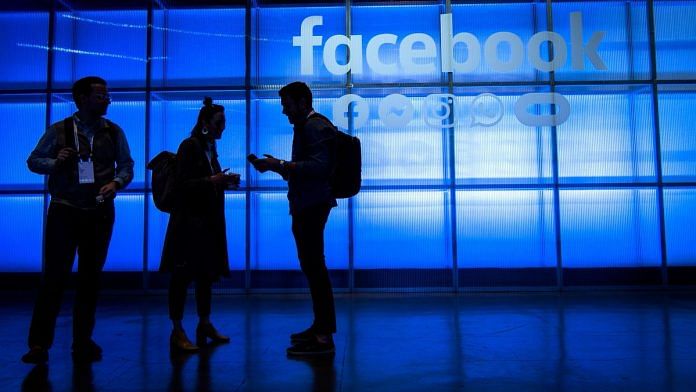New Delhi: A former employee of Facebook (now Meta) has alleged that the social media giant did not take action against a network of fake accounts “directly tied” to BJP MP from Kaushambi (Uttar Pradesh) Vinod Sonkar, even though it did so for other clusters, including one linked with three leaders of the Punjab Congress — Arun Dogra, Sunder Sham Arora and Balwinder Singh Laddi (both Arora and Laddi have since joined the BJP).
Sophie Zhang, a former data scientist with Facebook, has gone public with screenshots to back her claims after saying she waited for six months to depose before a parliamentary committee in the Lok Sabha, but did not get a response from the Speaker.
Zhang had told ThePrint last August that she had discovered four (although she now says there were five) “fake networks” linked to Indian politicians in December 2019. These networks of inauthentic accounts were boosting political messages to support specific politicians in violation of Facebook guidelines, Zhang had claimed.
Three networks were removed within a month, but another — linked to a BJP MP — was still active when she was terminated from her job at Facebook in September 2020, Zhang had said. Back then, Zhang had not named any politicians.
Now, however, Zhang has claimed that the “fake accounts were tied directly to the personal account” of BJP MP Vinod Sonkar. This indicated, she said, that “someone with personal access to the MP’s account was running these fake accounts… the MP himself, an employee, a family member, etc”.
Zhang added that although Facebook had taken action against another cluster of accounts, associated with the three Punjab leaders via their page administrators, she had chosen to name them too because they should be having “some level of responsibility”.
She has not released the names of politicians allegedly benefiting from the remaining three networks, saying there is no evidence that they are directly linked or responsible.
When asked about Zhang’s allegations, close associates of each of the four named politicians denied that their social media presence utilised fake accounts.
In a statement, a Meta spokesperson said that “we fundamentally disagree with Ms Zhang’s characterisation of our priorities and efforts to root out abuse on our platform”.
A source associated with Meta added that the company had not found any “conclusive evidence” that Sonkar was “involved in the network”.
Zhang, however, shared documentation with ThePrint to back her claim that Meta treated the network linked with the BJP MP differently from others.
She said she made the information public after concluding that she would not get the chance to testify formally before the standing committee on information technology.
Also Read: Coordinated campaign? India #1 source for pro-Russia tweets amid Ukraine war, says Ashoka study
Why did Lok Sabha testimony ‘not materialise’?
When Zhang was fired from Facebook, she wrote a long internal memo saying she felt as if she had “blood on my hands” because of what she described as lack of action against fake accounts used for political manipulation.
In October 2021, she testified about the issue before the British Parliament and announced that she was “willing to testify before the parliament of any democratic nation”, including India.
The next month, Congress MP Shashi Tharoor, who heads the standing committee on information technology, indicated that Zhang’s testimony could take place after the Lok Sabha Speaker gave his assent.
“Testimony in person by witnesses from abroad [Zhang is an American citizen] requires the Speaker’s consent. This is being sought,” Tharoor had tweeted.
This has just happened & with its agenda official, the Committee will hold its first meetings of the new session on Nov16&17. Under our procedures videoconferencing is not permitted. Testimony in person by witnesses from abroad requires the Speaker’s consent. This is being sought
— Shashi Tharoor (@ShashiTharoor) November 1, 2021
According to Zhang, she submitted her evidence to the parliamentary panel in November 2021, but her invitation to depose never came.
On 16 May this year, she tweeted: “I still have not heard from the honorable speaker. I no longer believe that I will ever hear from him.”
It's been 13 months since I came forward as a whistleblower, and 6 months since the Lok Sabha asked for Speaker @ombirlakota to approve my testimony.
I still have not heard from the honorable speaker. I no longer believe that I will ever hear from him.https://t.co/uEeM38Gx1E
— Sophie Zhang(张学菲) (@szhang_ds) May 16, 2022
When ThePrint investigated the reasons behind the delay, it received contradictory responses about the hold-up and parliamentary committee rules.
Rajeev Dutta, officer on special duty (OSD) to Lok Sabha speaker Om Birla, told ThePrint: “Parliament committees are governed by Parliament rules and procedure. Currently, no approval is pending from Speaker office.”
However, former secretary-general of the Lok Sabha, P.D.T. Achary, said there is “no specific rule or procedure with regard to calling a foreigner for evidence”.
According to him, a “dispute” within the committee may be behind the delay.
“If a particular foreign national has not yet received an invitation to depose, then there must be some dispute within the committee about witness choice,” he said.
Achary added that the onus of facilitating a deposition lay primarily with the committee.
“When a question arises as to whether the evidence of a person, national or foreign, is relevant for the purpose of the committee, it’s referred to the Speaker, whose decision is final. Relevance is the only point that needs to be examined by the Speaker. It is the committee’s duty to remind and follow up with the Speaker about a decision.”
When asked if there had been a disagreement within the panel, a member of the IT parliamentary committee told ThePrint that there was “no dispute”.
“The committee unanimously resolved to invite Sophie Zhang in November,” the member said. “But, the Lok Sabha Secretariat insisted it could not be done without the Speaker’s approval, probably because of the expenses involved in bringing an overseas witness over.”
The member added that the committee’s secretary wrote to the Speaker’s office several times, but there was “still no reply”.
According to this member, the Speaker’s approval is sought for all witnesses, domestic or foreign. “The committee secretary has sought and received the Speaker’s approval every time we have invited any witness to testify,” he said.
The member said that though the panel has read and deliberated over Zhang’s written submission, MPs can only question and get “spontaneous responses” when a witness formally appears before the committee.
Also Read: Al Jazeera claims FB ran ‘surrogate ads’ to help BJP in 2019. Jio-funded news site denies link
The evidence Zhang shared
Zhang was hired by Facebook in January 2018 as a data scientist in a team dedicated to weeding out “fake engagement” — likes, comments, shares, and reactions — by inauthentic accounts.
In the course of her work, she is said to have found problematic activity linked to political accounts in India in December 2019 and flagged them for action.
The evidence that she shared with the parliamentary committee — and now the media — includes a series of annotated screenshots that appear to be from an internal task management system meant for Facebook employees.
These, Zhang said, illustrate that the company did not address all red flags in the same manner.
The screenshot below appears to show that a “task” was created on 2 December 2019 to take action on three fake account networks. Then, on 10 December 2019, Zhang is seen to have messaged on the internal system that a fourth fake account network linked to BJP MP Vinod Sonkar had been detected.
“We’ve began [sic] also witnessing inauthentic coordinated activity of this nature on Lok Sabha MP Vinod Sonkar [BJP-Kaushambi]”, constituency in Uttar Pradesh. The fake accounts linked to the MP showed “actions on Mr Sonkar consist purely of positive reactions and reshares of his post…,” Zhang wrote on the messaging system.
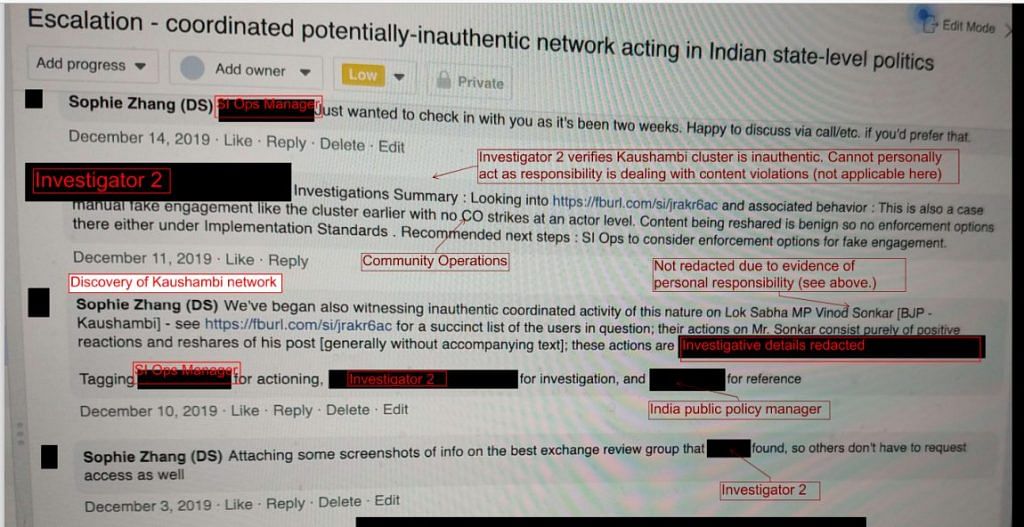
The next screenshot seeks to show that, by 19 December, the company had taken down the first three networks of fake accounts. A Facebook employee talks of enrolling the suspicious accounts into a system called “UFAC”.
This acronym stands for “Unified Fake Account Checkpoint”, an enforcement action taken by Facebook where users must provide identity proof to retain the account. The account is locked until this proof is provided. If the checkpoint is not passed in the set time, the account is permanently disabled and removed.
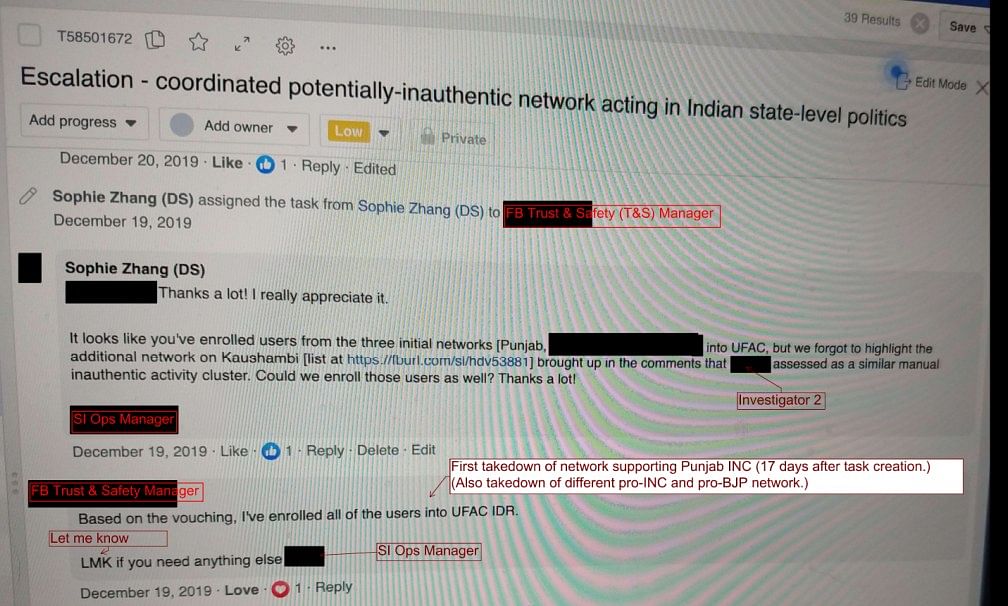
Subsequent messages appear to show that between 19 December 2019 and 3 February 2020, Zhang made five requests for the fake accounts linked with Sonkar to be actioned.
The screenshot below shows the response of another employee to Zhang’s first request to remove the Sonkar network.
Seemingly expressing reservations, this employee wrote: “[J]ust wanted to confirm that we’re comfortable working on these actors. One of these users [i.e. Vinod Sonkar] has the XCHECKs: BoB [Book of Business]- Government Partner Text Tag…” Sonkar, this employee noted, was also tagged as a “High Priority—Indian”.
Meta uses a system called XCheck, or cross-check, to exempt high-profile accounts from automated enforcement, which in essence means that they can be allowed to bypass some rules.
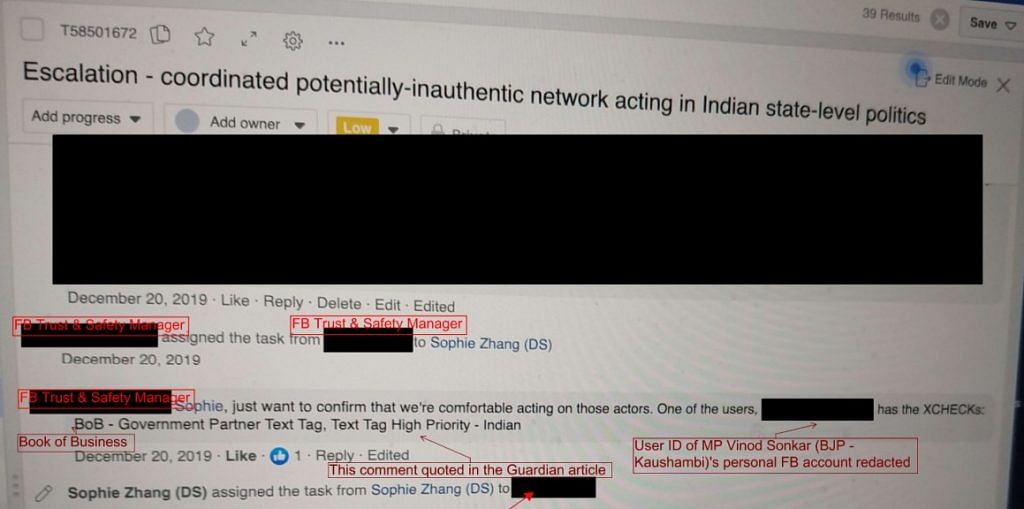
The screenshot below shows how Facebook acted quickly against a pro-Congress network, which included accounts that later started supporting the Aam Aadmi Party (AAP) during the 2020 Delhi elections. After the fake accounts in this network resurfaced (after the first takedown noted on 19 December), they were removed on 4 February 2020, 16 days after discovery, the screenshot shows.
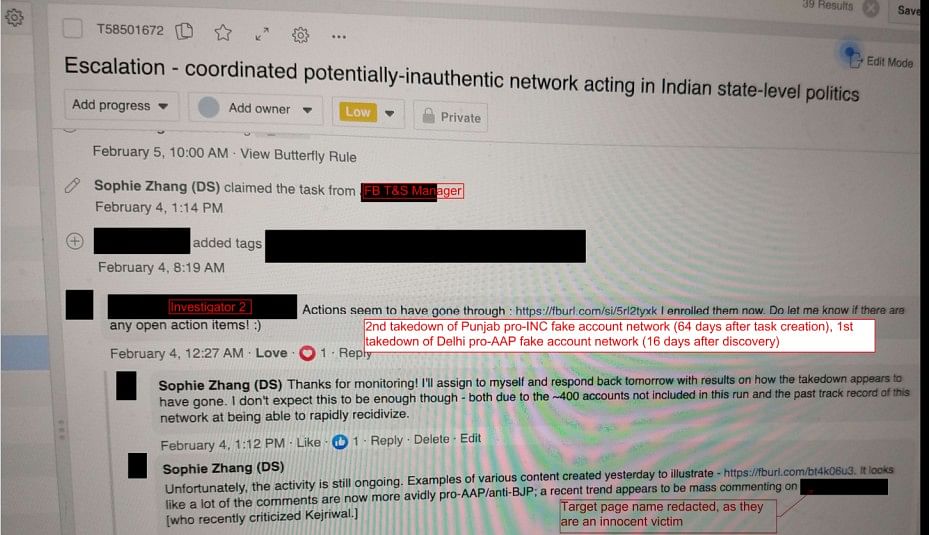
On 7 February 2020, as the screenshot below shows, Zhang notes that the Facebook page admins of three politicians — Sunder Sham Arora, Arun Dogra, and Balwinder Singh Laddi — “were directly tied to fake accounts” supporting the Congress in Punjab. In her annotation, Zhang says this shows the “same methodology as for MP Sonkar”.
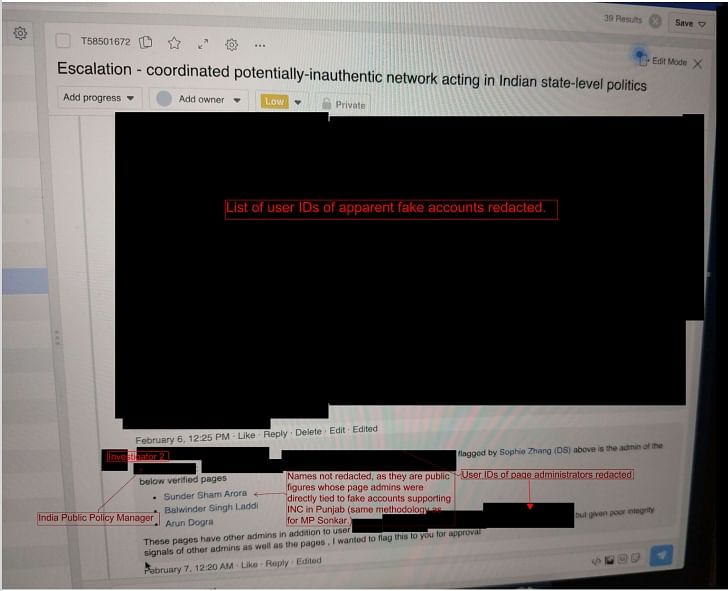
In the next screenshot, Zhang notes that in eight hours, a key India policy executive, Shivnath Thukral, had approved for accounts linked to these three politicians — all three linked to the Congress at the time — to be disabled. “Compare with non-response for Vinod Sonkar,” Zhang said in an annotation.
When asked about Zhang’s claims on Thukral’s actions, a Meta spokesperson said it was “a completely wrong assertion”.

Zhang did not reveal the exact methodology used to tie these politicians to fake accounts. However, a screenshot of an internal post Zhang shared shows a user’s “device/network-level signals” logged by Facebook and linked to the user account is used to detect inauthentic activity.
Facebook/Meta also uses IP addresses to detect coordinated inauthentic activity. Other signs of a fake account include a very recent account creation date, absence of “friends” or information, and lack of a profile picture.
Signs of inauthenticity also include many accounts logging in from the same device and then performing the same actions, or if a group of accounts logs in on the same device and is active only at the same time each day, typically working hours on weekdays.
This last pattern, Zhang said, could be a sign of an IT cell operating, “as their employees naturally resist nonstandard work hours”.
Zhang had earlier told ThePrint that the India-linked networks discovered in 2019 ranged in size from several dozen to several hundred accounts. The network allegedly linked to the BJP MP comprised 54 accounts.
She further noted that the largest network had 1,090 accounts and displayed “unusual” activity. It was first detected supporting the Congress in Punjab. Then, during the 2020 Delhi assembly elections, it started supporting the AAP, Zhang had claimed.
To this end, it seemed to employ an unusual tactic to gain credibility by pretending to support the BJP and PM Modi, she had alleged. For example, the content would have a narrative like — “I voted for Modi, but Modi is getting it done nationally. Now it is time to support Arvind Kejriwal in Delhi”, Zhang had said.
According to Zhang, such activity could have also have been the result of the same marketing firm being unknowingly hired by different parties.
All 4 politicians say they ‘did not use fake accounts’
When ThePrint called the number listed for Vinod Sonkar on his page on the official Lok Sabha website, the person who answered said that only one verified page is managed for the politician and that there is no use of any fake accounts.
Sunder Sham Arora’s associate Harvinder said that Zhang’s information was wrong and only one page was associated with the politician. Harvinder said he was the only admin of the page.
An aide of Arun Dogra whose number is listed on Dogra’s verified Facebook page said no other accounts are run by him.
Balwinder Singh Laddi’s son Harry said he manages his father’s verified Facebook profile and does not run any fake accounts.
We strive to apply our policies uniformly: Meta
Meta has refuted Zhang’s allegations ever since she started making them.
In response to an email from ThePrint, a spokesperson said that Meta has “not been provided the documents and cannot speak to the specific assertions, but we have stated previously that we fundamentally disagree with Ms Zhang’s characterisation of our priorities and efforts to root out abuse on our platform. We aggressively go after abuse around the world and have specialised teams focused on this work”, including in India.
On Zhang’s claim that Shivnath Thukral, the then Facebook policy head in India, gave approval within hours to take down fake accounts associated with the three Congress leaders but did not act expeditiously where the BJP MP was concerned, the Meta spokesperson said that the allegation was incorrect and reflected “a limited understanding” of how the company enforces its policies. Indian public policy, he added, is just one input.
“The decisions around content escalations are not made unilaterally by any one person, including any one member of the India public policy team; rather, they are inclusive of views from different teams and disciplines within the company.
“The process comes with robust checks and balances built in to ensure that the policies are implemented as they are intended to be and take into consideration applicable local laws. We strive to apply our policies uniformly without regard to anyone’s political positions or party affiliations,” the spokesperson said.
On the XCheck system under which Sonkar’s status as a “high-profile Indian” and “government partner” may have come into play, the spokesperson said it existed to “create an additional step so we can accurately enforce policies on content that could require more understanding”. Efforts were on, the spokesperson said, to “improve how the system operates”.
Off the record, a source associated with Meta said that in some instances “there is an extra layer of checks for sensitive situations”, but that this was to avoid mistakes rather than “create two systems of justice”. The source acknowledged that the system “isn’t perfect”.
“We will ask the Oversight Board to review our cross-check system, make recommendations for how it can be improved, and provide guidance on the criteria we use to determine what is prioritised for a secondary review,” the source said.
When asked about Sonkar, the source said: “We did not find conclusive evidence that this individual was involved in the network.”
(Edited by Asavari Singh)
Also Read: How Facebook whistleblower Frances Haugen left Mark Zuckerberg speechless


